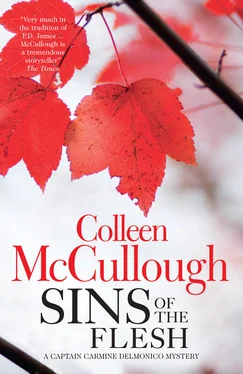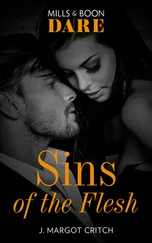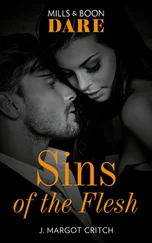1 ...7 8 9 11 12 13 ...17 “I’m Carantonio because I’m illegitimate,” Rufus interjected. “I have no idea who my father is—my mother put him down on my birth certificate as first name, Un, and second name, Known.”
Rha took up the narrative. “Fenella—Rufus’s mother—died in 1950, but unlike the original Nell, she did leave a will. Antonio Carantonio IV—Rufus—got the lot.” He heaved one of his sighs, both hands flying into the air. “Can you imagine it, Abe? There we were, a couple of sweet young things, with a positive barn of a house and carloads of money! Fenella had quintupled the first Nell’s fortune and kept the house in repair. Our heads had always been stuffed with dreams and we’d made good beginnings, but suddenly we had the capital and the premises to do whatever we wanted.”
“And what did you want?” Abe asked.
“To design. Glamorous clothes for so-called unattractive women, first. Then bridal gowns. After that came stage costumes, and finally production design. Wonderful!” Rha caroled.
“Wonderful,” Rufus echoed on a sigh.
“Let’s get out of here and have an espresso,” said Rha.
Shortly thereafter Abe found himself drinking superb coffee in a small room off the restaurant-sized kitchen; its chairs were upholstered in fake leopard skin and were replete with gilded carvings, the drapes were black-and-gold-striped brocade, and the floor was a black-spotted fawn marble. All it needs, thought Abe, is Mae West.
“The nice thing about Fenella—Nell the second—is that she approved of gays,” said Rufus. “She was a good mother.”
“Stop chattering, Rufus! Let the man state his business.”
Abe did so succinctly, unsure whether rumors about the six Doe bodies had ever penetrated as high in homosexual strata as this one, since neither he nor his team had ever approached Rha and Rufus, but all worlds gossip. “I’m going to have at least two likenesses of the later Does shortly, and I’m here to ask if you’d mind looking at them,” Abe concluded. “One thing has emerged—that the Does were what my niece calls drop-dead gorgeous. Expert opinion says they weren’t—er—gay, but they were all around twenty years of age, and likely to be seeking careers on the stage, or in film, or maybe in fashion. Mrs. Gloria Silvestri said I should talk to you.”
Rha’s face lit up. “Isn’t she something? She makes all her own clothes, you know, so I take her around the fabric houses. Unerring taste!”
“Let the man state his business, Rha,” said Rufus softly, and took over. “I know what she was thinking. We always have scads of young things passing through and learning the trade. At seventy miles from New York City, Holloman is an ideal jumping-off place before hitting the urban nightmare. Girls and boys both, we see them. They stay anything from a week to a year with us, and I’m glad you found us first rather than last. We might be able to help, but even if it turns out we can’t, we can keep our ears and eyes open.”
Down went his empty coffee cup; Abe stood. “May I come back with my sketches when our police artist has finished?”
“Of course,” said Rha warmly.
On his way to the front door, Abe had a thought. “Uh—is Peter the lighting blighter okay?”
“Oh, sure,” said Rufus, he seemed taken aback that anyone should remember a lighting blighter. “He’s sucking a stiff Scotch.”
“Did you add the theater onto the house?”
“We didn’t need to.” Rufus opened the front door. “There was a ballroom out the back nearly as big as the Waldorf—I ask you, a ballroom? Debutantes running amok in Busquash.”
“I daresay they did back in the late 1800s and early 1900s,” said Abe, grinning, “but I can see why you gentlemen would find a theater stage far handier. Thanks for the time and the coffee.”
From a window the two partners in design watched Abe’s slight figure walk to a respectable-looking police unmarked.
“He’s very, very smart,” said Rufus.
“Definitely smart enough to tell a sequin from a spangle. I suggest, Rufus my love, that we be tremendously co-operative and astronomically helpful.”
“What worries me is that we won’t know anything!” Rufus said with a snap. “Gays aren’t the flavor of the month.”
“Or the year. Never mind, we can but try.” Came one of those explosive sighs; Rha’s voice turned weary again. “In the meantime, Rufus, we have a pool of sicked-up grape juice to deal with.” He stopped dead, looking thunderstruck. “Gold!” he roared. “Gold, gold, gold! When the richest king in the world is blue from unrequited love, he does a Scrooge McDuck and rolls in gold, gold, gold!”
“Open treasure chests everywhere!”
“A waterfall of gold tinsel!”
“He’ll have to roll on a monstrous bean-bag of gold coins, that won’t be easy to make look convincing—”
“No, not a bean-bag! The pool of gold dust at the bottom of the tinsel waterfall, numb-nuts! He bathes in his sorrow!”
Rufus giggled. “He’ll have to wear a body suit, otherwise the tinsel will creep into every orifice.”
Rha bellowed with laughter. “So what’s new about that for Roger Dartmont? Shitting gold is one up on shitting ice-cream.”
Still chuckling at their shared visions of Broadway’s ageing star, the immortal Roger Dartmont, Rha Tanais and Rufus Ingham went back to work, imbued with fresh enthusiasm.
Abe went straight to see Hank Jones as soon as he returned from his interview with the design duo.
“How’s it going, Hank?”
The pencil kept moving. “A proposition, sir?”
“Hit me.”
The pencil went down. Hank flipped his left hand at two drawings of naked skulls side by side on his drawing board. “A black-and-white pencil sketch won’t do it, sir. James and Jeb will have different faces, but the sameness of the medium will diminish the differences and make the similarities overwhelming. They’re very much the same type, what I call a Tony Curtis face. I have to play up each man’s individuality! D’you get my drift, sir? Tony Curtis is a type.”
“Make it Abe, Hank. You’re as much a professional in your line as I am in mine, so formality’s not necessary.” What he couldn’t say was that he was beginning to realize their incredible luck in finding Hank Jones, clearly too good for the job’s pay and status. Not only was he an unusually gifted artist, he was also a young man who thought. In September he’d have to pow-wow with Carmine and Gus, then they could go to Silvestri to have Hank’s status and pay improved. “What do you suggest?” he asked.
“That I paint them rather than draw them,” said Hank eagerly. “Oh, not in oils—acrylic will do, it dries at once. Each Doe would have his natural color of hair, whatever the fashionable cut was that year, and the right skin tones. The eyes I’d do as blue, like Jeb’s.” Hank drew a breath. “I know speed is a part of my job description, but honest, I’m fast, even in paint. If you had a color portrait of Jeb and James at least, people’s memories would trigger better, I know they would. But it does mean a few extra days.”
Abe patted the artist on the back, no mean accolade. “Right on, Hank! That’s a brilliant idea.” He smiled, his grey eyes crinkling at their corners. “If you have a thoroughbred in the stables, don’t hitch him to a wagon. Use your talents, that’s what they’re there for. Take as long as it takes.”
“For Jeb, by Friday,” said Hank, delighted.
On the dungeon front, things were gloomier. Liam and Tony were wading through possible sites for a dungeon, but after Abe’s visit to Busquash Manor, they crossed it off their list; those gargantuan roofs hid not underground cells but a full-sized theatrical stage, complete with a trap room and pit below stage level. The whole area was in use, the acoustics superb—no, Busquash Manor was not a possible. When Kurt von Fahlendorf had been kidnapped they had ransacked Holloman County for a soundproof cellar, which made this new quest much easier. Most structures were listed, had been inspected then, and could be inspected again. The chamber where von Fahlendorf had languished had been filled in since. No local builder had installed a soundproof studio anywhere, and what new cellars had come into existence were just ordinary basements. War relics like gun emplacements hadn’t changed, and theaters in a try-out city like Holloman containing three repertory companies and a faculty of drama were, like Busquash Manor, in constant use.
Читать дальше












